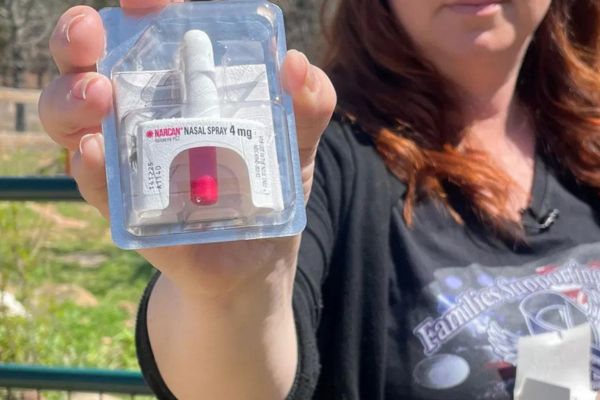
- Details
- By Elyse Wild
At the event, held by the Osage Nation Counseling Center (ONCC) and funded by a grant from the Indian Health Service (IHS) Community Opioid Intervention pilot project, attendees will receive free doses of Naloxone — more commonly known by the brand name Narcan — and training on how to use it.
It’s the second such event ONCC held in less than 30 days — the Tribe’s first-ever harm reduction event was held on June 7 and was successful in distributing more than 50 doses of Narcan to Osage County community members.
Harm reduction is an evidence-based public health approach that seeks to mitigate the negative impact of drug use through syringe exchange services, Narcan access, fentanyl testing strips and more. By providing these life-saving tools to community members living with opioid use disorder, the strategy aims to provide a low barrier of access for accessing health care and substance abuse treatment. As overdoses continue to climb across the nation and in Indian Country, more and more tribal communities are embracing harm reduction, with some"Indigenizing" the approach by infusing it with cultural practices.
Friday’s harm reduction event was originally scheduled for mid-July, but Jennifer McGlothlin, the clinical compliance coordinator at the Osage Nation Counseling Center, told Native News Online they saw a critical opportunity ahead of the Fourth of July holiday.
“We wanted to get it done by the Fourth of July weekend,” Jennifer McGlothlin, clinical compliance coordinator at the Osage Nation Counseling Center, told Native News Online. “It could be a really, really high-risk weekend, and we wanted to pump it up a bit.”
Overdoses have risen exponentially in the United States over the past two decades, driven by the opioid epidemic and the proliferation of fentanyl — a highly potent synthetic opioid 50 to 100 times more potent than morphine — in the country’s drug supply.
According to data released earlier this month by the Centers for Disease Control and Prevention (CDC), more than 109,000 Americans died from drug overdoses in 2023, up more than 200% since 2000.
While Americans of all races and ethnicities have been affected, the proliferation of opioid deaths has disproportionately affected Black, Indigenous, and People of Color (BIPOC) communities, especially Indigenous people. In 2020, Native Americans’ opioid mortality increased 39% over the prior year — the second-highest rate of increase behind African Americans, according to the CDC.
McGlothlin says that despite seeing evidence of an increase in overdoses — overdose deaths increased across the state by 67% from 2019 to 2021, according to Oklahoma.gov — the community was hesitant to embrace Narcan.
“People were a little resistant, believing that we had an opioid problem here,” McGlothlin said. “Nobody wants to believe it’s in your neighborhood. We want to believe it happens elsewhere.”
Narcan has been declared a critical tool in saving lives and preventing overdoses. The drug works by blocking opioid receptors in the brain, reversing the effects of an overdose within minutes. Anyone can easily administer it and it effectively reverses 93% of overdoses.
Using funds from the IHS grant, the center launched a campaign to break the stigma that the availability of Narcan would potentially encourage drug use.
The year-long campaign included TV commercials on local news channels, billboards, and a hashtag campaign to educate the community about recovery from opioid use disorder.
“We really wanted to enforce that opioids hide in plain sight and tried to teach people be to be supportive of those in recovery,” McGlothlin explained. “I firmly believe in my heart that this community would embrace people in recovery; they just didn’t know how.”
“We had to trust that if we got those messages out there that people would become more accepting that the opioid crisis is here in our backyard, and that there is something that can be done about it, and that’s carrying Narcan.”
The ONCC Narcan Drive takes place on Friday, June 30, from 10:00 a.m. to 2:00 p.m. at 219 West 1st Street, Hominy, Oklah. The event is free and open to the public.
Tell Us What You Think
More Stories Like This
Cherokee Nation Proposes $30 Million OU Nursing School Partnership to Expand Health WorkforceHealth Stories We’ll Be Following in 2026
Indian Country Faces Crippling Premiums Under Expired Affordable Care Act Credits
Artificial Intelligence Impacts the Art and Science of Dentistry – AI Part 2
Feds Announce $50 Billion to States for Rural Health, Tribes Barely Mentioned in Awards


